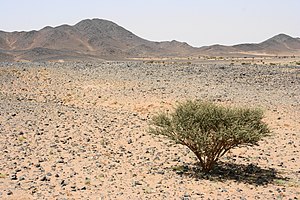
Back وقعة الحرة Arabic حره دؤیوشو AZB আল-হাররার যুদ্ধ Bengali/Bangla Batalla d'al-Harra Catalan Batalla de al-Harra Spanish ماجرای حره Persian Pertempuran al-Harrah ID Battaglia della Seconda Harra Italian ハッラの戦い Japanese Pertempuran al-Harra Malay
| Battle of al-Harra | |||||||
|---|---|---|---|---|---|---|---|
| Part of the Second Fitna | |||||||
 The battle was fought just north of Medina on terrain similar to this patch of basaltic, stony desert in the city's environs | |||||||
| |||||||
| Belligerents | |||||||
|
Umayyads |
People of Medina | ||||||
| Commanders and leaders | |||||||
|
Muslim ibn Uqba Marwan ibn al-Hakam |
Abd Allah ibn Hanzala † Abd Allah ibn Muti Ma'qil ibn Sinan al-Ashja'i | ||||||
| Strength | |||||||
| 4,000–12,000 | 2,000 | ||||||
| Casualties and losses | |||||||
| Unknown |
180–700 Ansar and Quraysh 4,000–10,000 other Medinans after the battle | ||||||
Location of the battle within modern Saudi Arabia | |||||||
The Battle of al-Harra (Arabic: يوم الحرة, romanized: Yawm al-Ḥarra, lit. 'Day of al-Harra') was fought between the Umayyad army of the caliph Yazid I (r. 680–683) led by Muslim ibn Uqba and the defenders of Medina from the Ansar and Muhajirun factions, who had rebelled against the caliph. The battle took place at the lava field of Harrat Waqim in the northeastern outskirts of Medina on 26 August 683 and lasted less than a day.
The elite factions of Medina disapproved of the hereditary succession of Yazid (unprecedented in Islamic history until that point), resented the caliph's impious lifestyle, and chafed under Umayyad economic acts and policies. After declaring their rebellion, they besieged the Umayyad clan resident in Medina and dug a defensive trench around the city. The expeditionary force sent by Yazid and local Umayyads, who had since been released from the siege, encamped at Harrat Waqim, where the rebels confronted them. Despite an initial advantage, the Medinans were routed due to the defection of one of their factions, the Banu Haritha, which enabled Umayyad horse riders led by Marwan ibn al-Hakam to attack them from the rear.
Afterward, the army pillaged Medina for three days, though accounts of the plunder vary considerably. The Syrian army proceeded to besiege the rebel leader Abd Allah ibn al-Zubayr in Mecca, though Ibn Uqba died en route. In contrast to Ibn al-Zubayr's call for a shura to decide the caliphate and his success in resisting the Umayyads, the rebels in Medina lacked a political program and military experience. The traditional Islamic sources list the Battle of al-Harra and its aftermath as one of the Umayyads' 'major crimes' and malign Ibn Uqba for his role in the plunder of Medina.[1]
- ^ Hawting 2000, pp. 47–48.
© MMXXIII Rich X Search. We shall prevail. All rights reserved. Rich X Search
